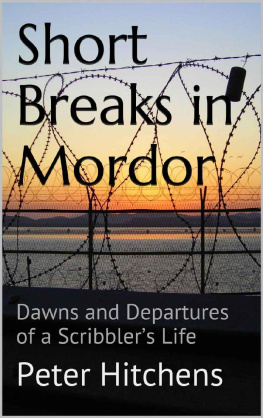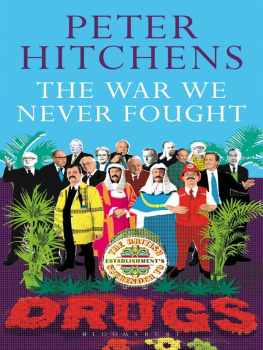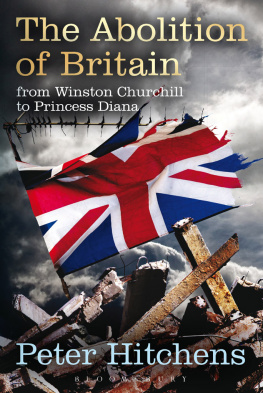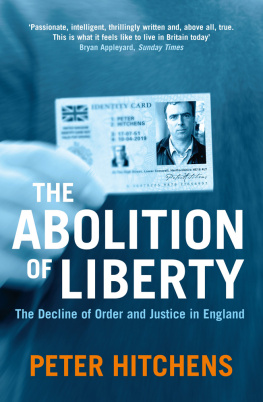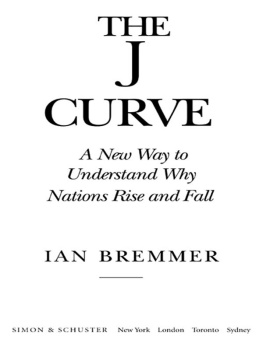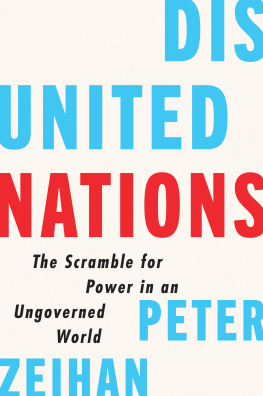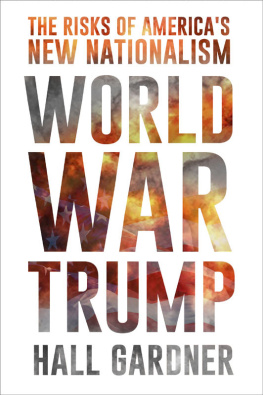Peter Hitchens - Short Breaks in Mordor: Dawns and Departures of a Scribblers Life
Here you can read online Peter Hitchens - Short Breaks in Mordor: Dawns and Departures of a Scribblers Life full text of the book (entire story) in english for free. Download pdf and epub, get meaning, cover and reviews about this ebook. year: 2018, publisher: Independently published, genre: Art. Description of the work, (preface) as well as reviews are available. Best literature library LitArk.com created for fans of good reading and offers a wide selection of genres:
Romance novel
Science fiction
Adventure
Detective
Science
History
Home and family
Prose
Art
Politics
Computer
Non-fiction
Religion
Business
Children
Humor
Choose a favorite category and find really read worthwhile books. Enjoy immersion in the world of imagination, feel the emotions of the characters or learn something new for yourself, make an fascinating discovery.
- Book:Short Breaks in Mordor: Dawns and Departures of a Scribblers Life
- Author:
- Publisher:Independently published
- Genre:
- Year:2018
- Rating:4 / 5
- Favourites:Add to favourites
- Your mark:
- 80
- 1
- 2
- 3
- 4
- 5
Short Breaks in Mordor: Dawns and Departures of a Scribblers Life: summary, description and annotation
We offer to read an annotation, description, summary or preface (depends on what the author of the book "Short Breaks in Mordor: Dawns and Departures of a Scribblers Life" wrote himself). If you haven't found the necessary information about the book — write in the comments, we will try to find it.
Short Breaks in Mordor: Dawns and Departures of a Scribblers Life — read online for free the complete book (whole text) full work
Below is the text of the book, divided by pages. System saving the place of the last page read, allows you to conveniently read the book "Short Breaks in Mordor: Dawns and Departures of a Scribblers Life" online for free, without having to search again every time where you left off. Put a bookmark, and you can go to the page where you finished reading at any time.
Font size:
Interval:
Bookmark:
Short Breaks in
Mordor
Dawns and Departures
of a Scribblers Life
Peter Hitchens
Copyright 2014, Peter Hitchens
Here I am again at border control, as a lady with epaulettes, savagely bleached hair and a large peaked cap glares first at me and then at my passport. Then she glares at me again. Then she looks in the angled mirror behind me, to check on the back of my head. I do not know why this is important. Perhaps she wants to make sure I am not wearing a wig. That mirror is always there, at every border crossing in every despotism in all the world. I just happen to have walked into this one, whichever it might be.
Probably she is a loving mother of six, but at the moment she is intent on glaring. Glaring is, after all, her job. Good for you, I am thinking. Your country may be a squalid tyranny ruled by a lunatic, but at least you dont let anyone in without checking their documents. How unlike The Country Formerly Known as Great Britain, where anyone can get in these days.
With a final glare, she whacks a blurred green entry stamp on my visa and thrusts my European Union passportthere are no British passports any moreback at me under the scratched window of armoured glass. All is in order. Either they havent realized what I am up to, or they dont care. The lock buzzes. I am across. And I am enjoying myself.
I like frontiers much as other people like restaurants, or whisky, or dancing. The very word sings to me of those thrilling thingsbarbed wire, floodlights, grimy booths paneled in fake veneer, stone-faced officials, women in pert uniforms, the feeling of danger without the reality of it, the shabby train to some enjoyably ill-lit city which waits on the far side of the inviting barrier.
At these strange places, human ideas solidify into walls, fences, and ditches. Theoretical lines on the map become visible. At the best of them, the experience is more or less unbelievable, an education in the limits and nature of power. A hundred yards away there is the rule of law, a free press flourishes, and you can say what you like about the government. But over here, even though you can actually see into the other place, prison and torture await the dissenter.
Perhaps my pleasure in borders results from growing up in a country that had none. Until very recently, you had to strain to tell which part of the United Kingdom you were in. All roads ended at the sea, not at a line of razor wire decorated with a foreign flag. The few boundaries that were properly marked were those that divided our ancient counties. Only in Ireland was there a demarcation line, almost impossible to descry as it wriggled through the landscape, but burned on mens minds so that its abolition will one day bring about rage in Belfast and ecstatic joy in Dublin. It does what all borders do. It makes you think harder than you did before about who and what you are, and what a country is, and why it matters. Utopia, you may be sure, has no borders. It goes on forever. There is no escape from it from horizon to horizon. World-reformers and egalitarians and multiculturalists hate borders. Globalists hate borders. But for me they are a sign that in different places men and women like to live in different ways and under different rules.
I have been one of the luckiest men alive, to see so much of the world when abroad was really abroad, when foreign was truly foreign. In the very last years of the old Fleet Street, generous editors sent me off into places where most people did not wish to go. But I did. Here is what I saw, and smelled and heard and learned. If you spend the winter months yearning for beaches and villas, if you long for luxury and Michelin restaurants, these journeys have little to offer you. You are well provided for already by a thousand conventional travel books. For anyone who longs for experience rather than luxury, who will bear a little discomfort in return for a little adventure, who knows how to turn his or her sense of humour up higher when things do not go quite as you planned, what follows is for you.
The Temptations of Mordor Explained
Here is a note of explanation for those who do not know that Mordor is the headquarters of evil in J.R.R.Tolkiens epic of power and temptation, The Lord of the Rings. It lies beyond a great black gate and a line of hideous fortresses, cut off from kinder lands by jagged mountains patrolled by foul creatures. Its air is vile and its water foul, its skies red with volcanic fire or black with smoke. And yet it has inhabitants, an economy, roads and cities, not to mention the usual utopian apparatus of prisons, secret police, slave-drivers, surveillance and torture chambers. Presumably it has a privileged class. Nowadays I expect it has rock-music radio stations and TV channels showing talent contests (just as I am sure Hell now possesses these facilities). I have heard of no hotels but the idea that sympathetic tourists, gullible journalists and fellow-travellers might have voyaged there, been entertained to lavish dinners in Lugburz, and reported back on its successful five-year plans, its rapid economic development and its orderly streets, has always amused me. I have often thought that Tolkiens books lacked enough detail of daily life under the firm governance of Mordors supreme leader, the Dark Lord Sauron.
There is another fascinating feature of travel beyond the tourist zones. It locates bad, strange or frightening things in specific places, where with any luck they will stay unless rashly disturbed. Since I first saw the word Jerusalem on a signpost, I have been enthralled by the idea that myths and ideas are often located in actual physical settings with map references and railway stations.
That is why I did consider calling this book The Moscow-Jerusalem Express, a train journey I would love to take, but which is made quite impossible forever by politics, oil and religious strife. The trouble was that, working under that title, I could not stop imagining the details of such a land-voyage, from the menu in the dining car as it rumbled southwards(Siberian Pelmeni, mushrooms in sour cream, vodka, Hachapuri, Lavash, plov, falafels, Daghestan cherries, Turkish coffee, wistful Georgian wines,) to the time of day at which it would pass Mount Elbrus, roll along the Caspian shore, or call at Tbilisi. One day I will try to imagine the whole thing, but for now I must put it to one side.
The thing that took hold of me when, aged 12, I first opened The Lord of the Rings was a very simple sensation, which grew as I turned the pages. It was the captivating idea that, just beyond the visible edges of my world, mystery and danger lay. They would not come to me, but I could go to them. In a place as safe as the England of my childhood, this idea provided excitement and reassurance at the same time. It was much like the glow of comfort and security which comes when you reach a warm dry shelter just before an enormous storm breaks over your head.
Past that line of hills, or through that wood or over that river, a wild and unpredictable world began, and the delicious fear of it made life especially pleasing where I was. It also inspired me to plan adventures in which I might be the hero. To this day I feel it most strongly when I am near high hills or mountains. But forests can do it too. The Wild Wood in Kenneth Grahames Wind in the Willows was my first introduction to the idea that freezing fear and panic could exist amidst the peace of an English landscape.
So for me the first sight of the Iron Curtain was the fulfillment of a childhood fantasy. It was the edge of the great dark forest, imagined for decades, now reached at last. And to cross it was a privilege and a joy. Far too much has been written about the Berlin Wall, and all I will say here is that I admit candidly how much I enjoyed going through it, and how much I miss it. How cruel of me, to wish tyranny on others for my own amusement. But is it? I am quite sure that the sweeping away of the Wall brought a new form of tyranny to countries, such as my own, that were previously free. Now that the ideas of the Left no longer take this solid, ugly, concrete form, they can spread all the more easily into places where most citizens once had more sense than to listen to them. I wish nothing, good or bad, on the peoples of other countries. The one certain thing I have learned from all my travels is that other peoples internal affairs are none of my business. But the state of my own country is my concern, and if its freedom and prosperity are bought at a cost to others, then I must honestly admit that this is a price I am willing to pay. Everyone who has considered the matter with any care believes this in practice. I just think it would be dishonest not to say it.
Next pageFont size:
Interval:
Bookmark:
Similar books «Short Breaks in Mordor: Dawns and Departures of a Scribblers Life»
Look at similar books to Short Breaks in Mordor: Dawns and Departures of a Scribblers Life. We have selected literature similar in name and meaning in the hope of providing readers with more options to find new, interesting, not yet read works.
Discussion, reviews of the book Short Breaks in Mordor: Dawns and Departures of a Scribblers Life and just readers' own opinions. Leave your comments, write what you think about the work, its meaning or the main characters. Specify what exactly you liked and what you didn't like, and why you think so.

